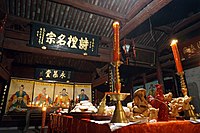Chinese ancestor worship

In China, people believe that their ancestors (their grandparents, great-grandparents, and so on) are still with them in some way, even after they die. Ancestor worship is a way of showing respect and gratitude to these ancestors, and asking them for help and protection from the spirit world.
When someone dies, their family will usually set up a shrine in their home, with pictures or statues of their ancestors. They might also light incense or candles, and offer food and drinks as a way of inviting their ancestors to come and visit. People will often bow or kneel in front of the shrine and pray, asking for their ancestor's blessing and guidance.
During important holidays and festivals, such as the Chinese New Year or Tomb Sweeping Day, people will often visit their ancestors' graves to clean them and offer gifts. They might also burn paper money or other objects as a way of sending blessings and good fortune to their ancestors in the afterlife.
For many Chinese people, ancestor worship is an important part of their culture and tradition. It helps them feel a connection to their family and history, and provides them with a sense of spiritual guidance and protection.
When someone dies, their family will usually set up a shrine in their home, with pictures or statues of their ancestors. They might also light incense or candles, and offer food and drinks as a way of inviting their ancestors to come and visit. People will often bow or kneel in front of the shrine and pray, asking for their ancestor's blessing and guidance.
During important holidays and festivals, such as the Chinese New Year or Tomb Sweeping Day, people will often visit their ancestors' graves to clean them and offer gifts. They might also burn paper money or other objects as a way of sending blessings and good fortune to their ancestors in the afterlife.
For many Chinese people, ancestor worship is an important part of their culture and tradition. It helps them feel a connection to their family and history, and provides them with a sense of spiritual guidance and protection.
Related topics others have asked about:
